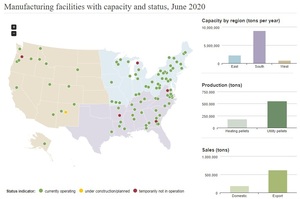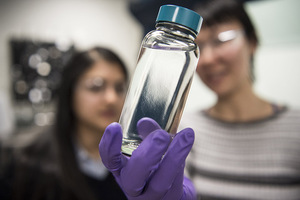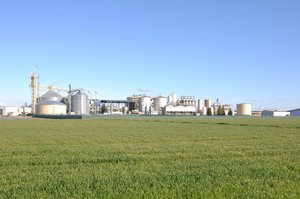Origin launches new biofuels initiative, partners with Avantium
Energy Disrupter
ADVERTISEMENT
Origin Materials Inc. on Feb. 23 held a fourth quarter earnings call, discussing progress with the development of the company’s first commercial-scale facility, a newly launched biofuel initiative and a new partnership with Avantium.
Origin’s first commercial-scale facility is mechanically complete and currently undergoing commissioning with startup scheduled to begin during the second quarter of this year, according to statements made during the earnings call.
The plant, referred to as Origin 1, is a sustainable-materials production facility located in Sarnia, Ontario, that will utilize the company’s technology platform to convert carbon found in sustainable wood residues into biobased materials while capturing carbon. Origin 1 is expected to have the capacity to process 25,000 dry metric tons of biomass annually and produce a variety of sustainable materials, including chloromethylfurfural (CMF), which can be converted into high-performance products used in packaging, textiles, apparel, automotive and other applications, as well as hydrothermal carbon (HTC), which can be used in fuel pellets, as activated carbon, and as a replacement for carbon black.
During the earnings call, John Bissell, co-founder and co-CEO of Origin, said the plant’s critical mechanical systems have been successfully installed and commissioning has begun. Leading up to mechanical completion, he said the company received and installed additional equipment, including wood handling equipment, piping, tanks and control systems. During the fourth quarter, Origin also strengthened the Origin 1 operations team and support staff, Bissell said. The company currently expects to gradually ramp up operations at Origin 1 throughout this year.
“At Origin 1, we expect to develop new, performance-advantaged products beyond PET and HTC fuel pellets so that customers can conduct development work and testing,” Bissell said. “Apart from paraxylene and bio-PET, using product from Origin 1, we plan to explore or qualify FDCA, epoxies, resins, surfactants, sustainable carbon black, bio-asphalt, fuel pellets, and biofuels,” he added, noting those products tend to be higher-margin applications for the company’s materials than PET and HTC fuel pellets.
Bissell also discussed Origin’s new biofuels initiative. “We are excited to announce this quarter that we are exploring application development for biofuels from an oils and extractives stream co-produced alongside CMF and HTC,” he said. “Biofuels are a rapidly growing market where demand is currently being met primarily via food-derived feedstock sources such as soy, used cooking oil, and tallow. In contrast, cellulosic biofuels or biointermediates made from wood waste reflect the future of the biofuel industry and are highly sought after as they do not compete with land for growing food. Origin is uniquely positioned to deliver these renewable fuels using a third intermediate stream, oils and extractives which, as mentioned, was not included in our previous plans. Over the long-term, we see the potential for these cellulose-derived, low-carbon-intensity fuels to be used in transportation and marine fuel, industrial applications, and heat and power generation. We are currently in preliminary discussions with multiple strategic partners to advance this exciting development.”
Origin is also working to develop a second commercial-scale facility, Origin 2, in Geismar, Louisiana. In January, Origin announced that the Louisiana State Bond Commission unanimously passed a resolution granting its final approval of the issuance of up to $1.5 billion of tax-exempt bonds to support construction and commissioning of Origin 2. Bissell said the company continues to make progress on the front-end design, construction planning, and financing for the facility.
Also during the call, Bissell discussed the partnership Origin has formed with Avantium, which was announced Feb. 21. According to Origin, the partnership aims to bring together the strengths of Origin’s patented carbon-negative technology platform, which turns the carbon found in sustainable wood residues into useful materials including CMF with Avantium’s YXY Technology, which can be used to convert derivatives of Origin’s CMF into FDCA, the chemical building block for the polymer PEF, at attractive unit economics.
















